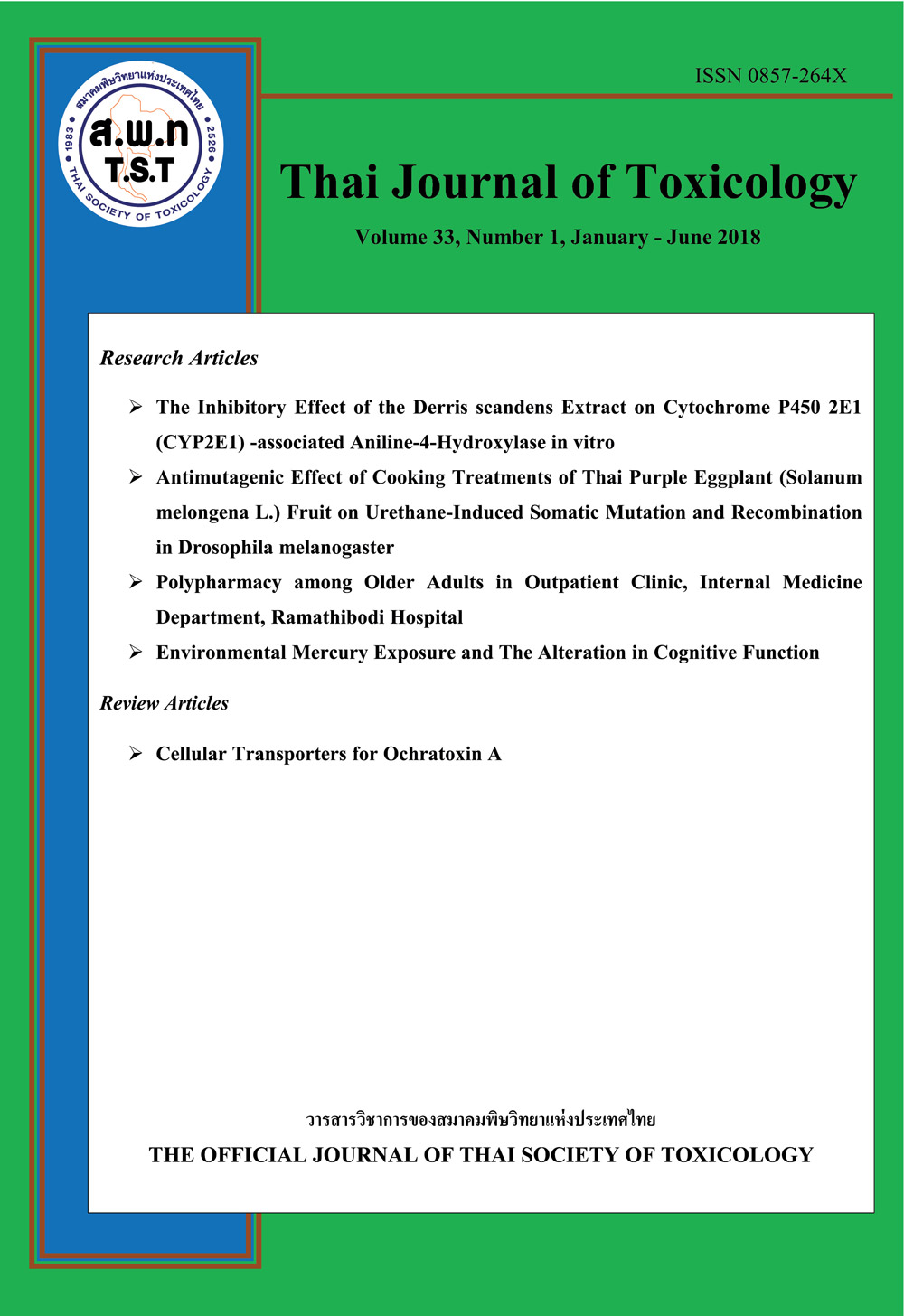ฤทธิ์ต้านการก่อกลายพันธุ์ของมะเขือม่วงไทยที่ผ่านกระบวนการปรุงอาหารจากการเหนี่ยวนำให้เกิดการก่อกลายพันธุ์ในแมลงหวี่ด้วยสารยูรีเทน
Main Article Content
บทคัดย่อ
มะเขือเป็นแหล่งที่ดีของสารต้านอนุมูลอิสระ และกระตุ้นการกำจัดสารพิษพวกอิเล็คโตรไฟล์ คณะผู้วิจัยศึกษาผลของมะเขือม่วงกลมดิบ และที่ผ่านการปรุงอาหารต่อการต้านการก่อกลายพันธุ์ของสารก่อกลายพันธุ์มาตรฐานยูรีเทนทดสอบในแมลงหวี่ โดยมะเขือม่วงกลมดิบถูกตัดเป็นชิ้นเล็กและแบ่งออกเป็นสองส่วน ส่วนแรกถูกแช่แข็งทำให้เป็นผงและเก็บไว้เป็นตัวอย่างกลุ่มควบคุม ส่วนที่สองถูกนึ่ง จากนั้นนำมาแช่แข็งและทำให้เป็นผง โดยครึ่งหนึ่งถูกเก็บเป็นกลุ่มตัวอย่างนึ่ง และอีกครึ่งที่เหลือถูกทอดจัดเป็นกลุ่มตัวอย่างทอด จากการศึกษาพบว่า กลุ่มตัวอย่างดิบและกลุ่มที่ได้รับการปรุงอาหารมีฤทธิ์ต้านอนุมูลอิสระและปริมาณสารฟีนอลิก กลุ่มตัวอย่างที่ผ่านการนึ่งทั้งที่ทอดและไม่ทอดเพิ่มฤทธิ์ต้านอนุมูลอิสระและปริมาณสารฟีนอลิกเมื่อเปรียบเทียบกับกลุ่มตัวอย่างดิบ จากนั้นศึกษาฤทธิ์ต้านการก่อกลายพันธุ์ในแต่ละความเข้มข้น ซึ่งตัวอย่างมะเขือถูกผสมพร้อมกับอาหารมาตรฐานและน้ำกลั่นหรือสารยูรีเทน โดยหนอนแมลงหวี่ชนิดพันธุ์ทางถูกเลี้ยงในหลอดทดลองที่มีอาหารดังกล่าวข้างต้น เมื่อแมลงหวี่โตเต็มวัยปีกของตัวที่รอดตายถูกนำมาวิเคราะห์ ผลการศึกษาพบว่าไม่มีกลุ่มตัวอย่างใดทำให้เกิดการกลายพันธุ์ ทั้งยังแสดงฤทธิ์ต้านการก่อกลายพันธุ์ โดยแต่ละกลุ่มตัวอย่างที่ถูกทดสอบพร้อมกับ สารยูรีเทนนั้นสามารถลดจำนวนของจุดที่ก่อกลายพันธุ์ทั้งหมดต่อปีก เป็นไปได้ว่า สารออกฤทธิ์สำคัญของมะเขือม่วงกลมเช่นกลุ่มของโพลีฟีนอล อาจเป็นตัวยับยั้งการออกฤทธิ์ทางชีวภาพของยูรีเทน นอกจากนี้ผลของกระบวนการปรุงอาหารอาจเพิ่มความสามารถในการออกฤทธิ์ต้านการก่อกลายพันธุ์ของมะเขือม่วงกลมได้ขึ้นกับชนิดหรือวิธีการปรุงอาหาร


